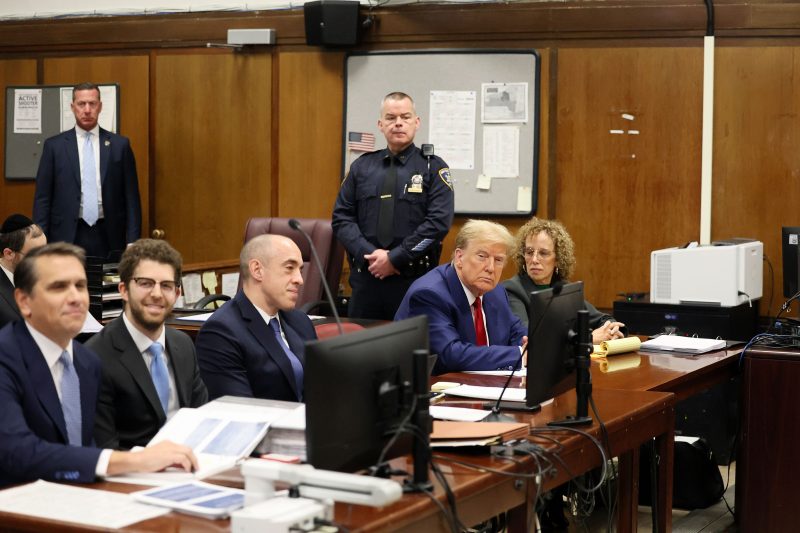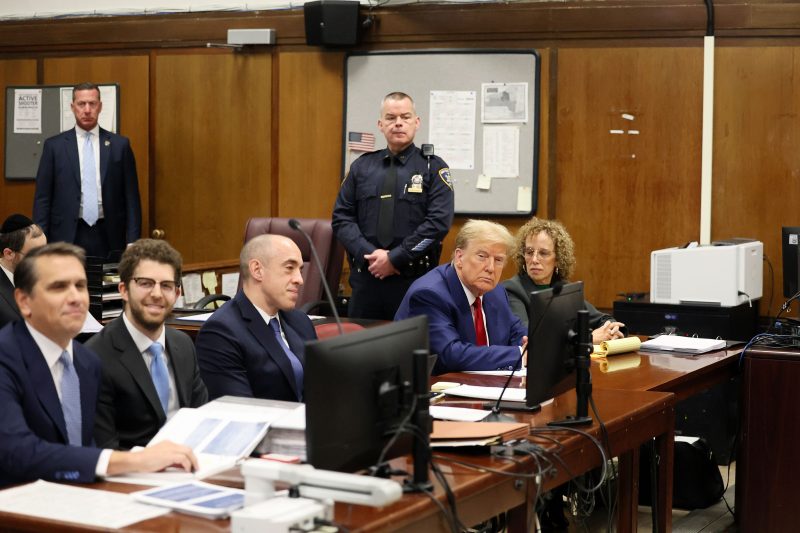
Donald Trump is facing felony charges in four separate criminal indictments in three states and Washington, D.C., with a guilty verdict in any of the cases possibly meaning a prison sentence.
The circumstances have raised an often-asked question: Could Trump, or anyone else, be convicted of a felony and serve as commander in chief, possibly from prison?
The short answer, legal experts said, is yes — because the U.S. Constitution does not forbid it.
“The Constitution has a limited set of requirements to be president. You have to be at least 35, a natural-born U.S. citizen and a resident here for at least 14 years,” said UCLA professor Richard L. Hasen, an election law expert.
Hasen said the 14th Amendment, passed by Congress after the Civil War, bars anyone who participated in an insurrection from running for the presidency. But “that’s not what Trump is on trial for in New York, and so there are no other restrictions,” he said, referring to the former president’s first criminal case, scheduled to begin with jury selection Monday.
Nor is Trump charged with insurrection in his other criminal cases.
The scenario might seem counterintuitive, given that numerous states prohibit felons from holding state or local office and even restrict their right to vote. As he has in so many respects, Trump is again testing political norms and demonstrating that just because the nation’s democratic system might not have anticipated an unlikely outcome does not mean it can’t happen.
Trump is charged in state court in New York with falsifying business records to conceal a hush money payment from voters in the 2016 election. He also faces charges in federal court in D.C. and state court in Georgia related to trying to overturn the results of the 2020 election. In Florida, he is under federal indictment for allegedly mishandling classified materials after leaving the White House and obstructing government efforts to retrieve them.
He has pleaded not guilty to all 88 counts that he faces.
In drafting the Constitution, the framers did not seriously consider that someone convicted of a significant crime would be a viable candidate for the White House, said Kimberly Wehle, a law professor at the University of Baltimore. Instead, she said, such a person presumably would be stunted in their political rise and unlikely to reach the highest levels of the American political system.
Applicants for many federal jobs, particularly in the intelligence and defense agencies, cannot pass background checks to gain high-level national security clearances if they have a criminal record. Why Congress, in passing the 14th Amendment, did not go further to ban all felons from the presidency is a question of political will, Wehle said.
“Why are we as a country so allergic to the idea of ensuring that people who reach that unparalleled position of power are subject to the same considerations and requirements that many people under his chain of command, and who hold regular jobs, have to comply with?” Wehle said.
At least once, a candidate who made it onto the presidential ballot conducted his campaign from a prison cell. In 1920, Eugene V. Debs, leader of the Socialist Party of America, stood as his party’s presidential nominee while serving a 10-year federal sentence for sedition over his vocal opposition to the involvement of the United States in World War I. Debs received roughly 900,000 votes, or about 3 percent of ballots cast that year.
Trump commands far greater public support: With the nominating conventions still months away, polls show him slightly leading President Biden in several swing states. Though some of the surveys indicate that his support could drop if he is convicted of a crime, Trump has consolidated backing within the Republican Party since the indictments began a little more than a year ago, vanquishing his rivals in the GOP primary contests.
A major challenge to his ability to run was rejected last month.
In December, the Colorado Supreme Court ruled that Trump could be kicked off the state’s primary ballot under Section 3 of the 14th Amendment because of his alleged involvement in inciting the Jan. 6, 2021, insurrection at the U.S. Capitol.
But the U.S. Supreme Court unanimously reversed that decision in March, stating that only Congress can enforce the constitutional provision that bars insurrectionists from becoming federal officeholders and candidates.
Legal experts said it would take a broader constitutional amendment, with the backing of two-thirds of Congress, to enact a ban to keep felons from running for the White House — a highly unlikely outcome given the nation’s sharply polarized political climate.
A legal solution “is not the best path,” said Chris Edelson, an assistant professor of government at American University. Rather, he said, Republican and Democratic leaders, along with the electorate, must reaffirm their commitment to democracy by rejecting candidates who have violated the law or been charged with crimes.
“In a healthy, functioning system there would have been a different nominee. Republicans would have said, ‘Hey, this is too much,’” Edelson said of Trump.
In most states, felons lose their voting rights for at least a limited period. In Florida, Trump’s state of residency, they must complete their sentences, including parole or probation, and pay fees and fines before regaining the right to cast a ballot.
That sets up the possibility that Trump, if convicted, could lose his right to vote while remaining on the presidential ballot.
Desmond Meade, executive director of the Florida Rights Restoration Coalition, said Florida’s felon voting ban is far too restrictive. He said it was ironic that in a GOP presidential primary debate last summer, Florida Gov. Ron DeSantis — who has opposed efforts to ease voting restrictions for those found guilty of crimes — indicated he would support Trump as the party nominee even if he were convicted. Five other then-candidates agreed.
“That was an amazing moment,” Meade said, “because if you’re willing to support someone running for president who has a felony conviction, there should be no reason you don’t support someone who has a felony conviction from being able to vote for who they want as president.”

